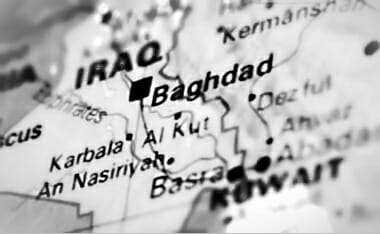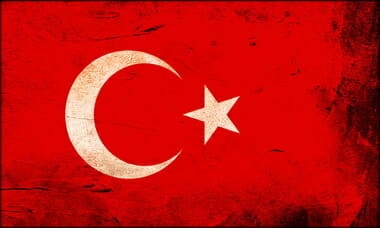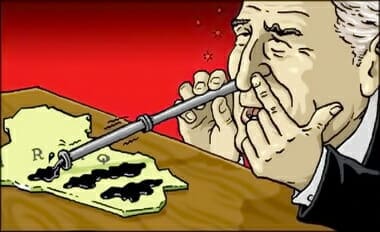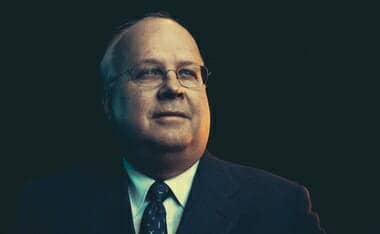Shaking Hands with Saddam Hussein: The U.S. Tilts toward Iraq, 1980-1984
….His December 1983 tour of regional capitals included Baghdad, where he was to establish “direct contact between an envoy of President Reagan and President Saddam Hussein,” while emphasizing “his close relationship” with the president [Document 28]. Rumsfeld met with Saddam, and the two discussed regional issues of mutual interest, shared enmity toward Iran and Syria, and the U.S.’s efforts to find alternative routes to transport Iraq’s oil; its facilities in the Persian Gulf had been shut down by Iran, and Iran’s ally, Syria, had cut off a pipeline that transported Iraqi oil through its territory. Rumsfeld made no reference to chemical weapons, according to detailed notes on the meeting [Document 31].
Rumsfeld also met with Iraqi Foreign Minister Tariq Aziz, and the two agreed, “the U.S. and Iraq shared many common interests.” Rumsfeld affirmed the Reagan administration’s “willingness to do more” regarding the Iran-Iraq war, but “made clear that our efforts to assist were inhibited by certain things that made it difficult for us, citing the use of chemical weapons, possible escalation in the Gulf, and human rights.” He then moved on to other U.S. concerns [Document 32]. Later, Rumsfeld was assured by the U.S. interests section that Iraq’s leadership had been “extremely pleased” with the visit, and that “Tariq Aziz had gone out of his way to praise Rumsfeld as a person” [Document 36 and Document 37].
Rumsfeld returned to Baghdad in late March 1984. By this time, the U.S. had publicly condemned Iraq’s chemical weapons use, stating, “The United States has concluded that the available evidence substantiates Iran’s charges that Iraq used chemical weapons” [Document 47]. Briefings for Rumsfeld’s meetings noted that atmospherics in Iraq had deteriorated since his December visit because of Iraqi military reverses and because “bilateral relations were sharply set back by our March 5 condemnation of Iraq for CW use, despite our repeated warnings that this issue would emerge sooner or later” [Document 48]. Rumsfeld was to discuss with Iraqi officials the Reagan administration’s hope that it could obtain Export-Import Bank credits for Iraq, the Aqaba pipeline, and its vigorous efforts to cut off arms exports to Iran. According to an affidavit prepared by one of Rumsfeld’s companions during his Mideast travels, former NSC staff member Howard Teicher, Rumsfeld also conveyed to Iraq an offer from Israel to provide assistance, which was rejected [Document 61].
Although official U.S. policy still barred the export of U.S. military equipment to Iraq, some was evidently provided on a “don’t ask – don’t tell” basis. In April 1984, the Baghdad interests section asked to be kept apprised of Bell Helicopter Textron’s negotiations to sell helicopters to Iraq, which were not to be “in any way configured for military use” [Document 55]. The purchaser was the Iraqi Ministry of Defense. In December 1982, Bell Textron’s Italian subsidiary had informed the U.S. embassy in Rome that it turned down a request from Iraq to militarize recently purchased Hughes helicopters. An allied government, South Korea, informed the State Department that it had received a similar request in June 1983 (when a congressional aide asked in March 1983 whether heavy trucks recently sold to Iraq were intended for military purposes, a State Department official replied “we presumed that this was Iraq’s intention, and had not asked.”) [Document 44]
During the spring of 1984 the U.S. reconsidered policy for the sale of dual-use equipment to Iraq’s nuclear program, and its “preliminary results favor[ed] expanding such trade to include Iraqi nuclear entities” [Document 57]. Several months later, a Defense Intelligence Agency analysis said that even after the war ended, Iraq was likely to “continue to develop its formidable conventional and chemical capability, and probably pursue nuclear weapons” [Document 58]. (Iraq is situated in a dangerous neighborhood, and Israel had stockpiled a large nuclear weapons arsenal without international censure. Nuclear nonproliferation was not a high priority of the Reagan administration – throughout the 1980s it downplayed Pakistan’s nuclear program, though its intelligence indicated that a weapons capability was being pursued, in order to avert congressionally mandated sanctions. Sanctions would have impeded the administration’s massive military assistance to Pakistan provided in return for its support of the mujahideen fighting the Soviet occupation of Afghanistan.)
In February 1984, Iraq’s military, expecting a major Iranian attack, issued a warning that “the invaders should know that for every harmful insect there is an insecticide capable of annihilating it whatever the number and Iraq possesses this annihilation insecticide” [Document 41]. On March 3, the State Department intervened to prevent a U.S. company from shipping 22,000 pounds of phosphorous fluoride, a chemical weapons precursor, to Iraq. Washington instructed the U.S. interests section to protest to the Iraqi government, and to inform the Ministry of Foreign Affairs that “we anticipate making a public condemnation of Iraqi use of chemical weapons in the near future,” and that “we are adamantly opposed to Iraq’s attempting to acquire the raw materials, equipment, or expertise to manufacture chemical weapons from the United States. When we become aware of attempts to do so, we will act to prevent their export to Iraq” [Document 42].
The public condemnation was issued on March 5. It said, “While condemning Iraq’s chemical weapons use . . . The United States finds the present Iranian regime’s intransigent refusal to deviate from its avowed objective of eliminating the legitimate government of neighboring Iraq to be inconsistent with the accepted norms of behavior among nations and the moral and religious basis which it claims” [Document 43].
Later in the month, the State Department briefed the press on its decision to strengthen controls on the export of chemical weapons precursors to Iran and Iraq, in response to intelligence and media reports that precursors supplied to Iraq originated in Western countries. When asked whether the U.S.’s conclusion that Iraq had used chemical weapons would have “any effect on U.S. recent initiatives to expand commercial relationships with Iraq across a broad range, and also a willingness to open diplomatic relations,” the department’s spokesperson said “No. I’m not aware of any change in our position. We’re interested in being involved in a closer dialogue with Iraq” [Document 52]….











